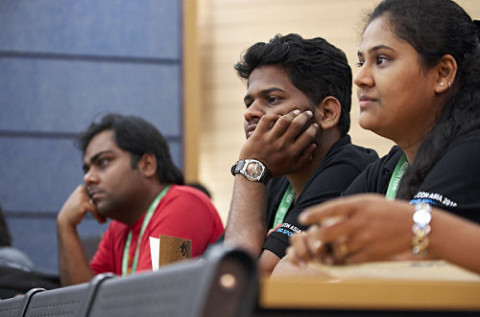The Essential Guide to Indian Business Etiquette
Manners mean a lot in Indian culture.
If you’re new to working with Indians or planning on a business trip to India, it’s crucial you brush up on your etiquette.
Making a great impression can do a lot to ingratiate yourself with your clients and colleagues, making getting things done a little bit easier.
For the next few minutes, we’re going to give you some essentials to be aware of around how to carry yourself.
This includes cultural faux pas, dos and don’ts plus general expectations around manners.
Don't miss the free INFOGRAPHIC at the end!
“To many, Indian thought, Indian manners; Indian customs, Indian philosophy, Indian literature are repulsive at the first sight; but let them persevere, let them read, let them become familiar with the great principles underlying these ideas, and it is ninety-nine to one that the charm will come over them, and fascination will be the result. Slow and silent, as the gentle dew that falls in the morning, unseen and unheard yet producing a most tremendous result, has been the work of the calm, patient, all-suffering spiritual race upon the world of thought.”
Swami Vivekananda (2015) “The Complete Works of Swami Vivekananda”
1. How to Greet People
- Indians greet one another with the namaste (palms together with a slight bow). It’s good manners to return it.
- In business, handshakes are now more common.
- Indian women may not shake hands with men; Western women should also wait for Indian men to extend their hands.
- Embracing is common between friends/colleagues but is only done with someone of the same gender.
2. How to Address People
- You may find differences across India but most people will use their first name followed by surname.
- Titles are important to if you’re meeting someone important make sure you initially use it.
- Many Indians in business will quickly tell you how to address them or make it obvious in some other way.
- If you have an official title, don’t be shy to use it. Status is important.
3. What to Wear
- Most foreigners wear their normal business attire, which is perfectly fine.
- In some places, a jacket and tie aren’t expected.
- Women should dress modestly, covering knees and shoulders.
- Pay attention to the season you are visiting in as the weather changes dramatically.
4. Eating Tips
- Indians build relationships with food.
- Wash your hands before you eat.
- Do not touch food with your left hand.
- Many Indians don’t drink alcohol.
5. Be Careful with Feet
- The feet are considered unclean.
- Don’t point your feet towards people or show the soles of your feet.
- Don’t touch your feet or play with them in front of others.
- Be prepared to take your shoes off in some places.

Indian culture is full of taboos.
Learn about 10 Taboos to Avoid When Doing Business in India
Photo by Gayatri Malhotra on Unsplash
6. What to Give as Gifts
- If invited to someone’s home, take a gift (sweets, candy, pastries)
- Gifts are not opened in front of the giver.
- Avoid animal by-products such as leather, gelatin, etc.
- Gifts are not usually given to people of the opposite sex.
7. How to Behave in Public
- Physical contact between the sexes is a no-no.
- Avoid holding hands, kissing, pinching cheeks and hugging between men & women.
- Men hold hands in India as a sign of friendship.
- Don’t point at people.
8. Differences with Personal Space
- Indians leave little personal space.
- They can be quite ‘touchy feely’ with people they know well.
- Don’t touch Indians on the head.
- It is inappropriate to touch or get too close to someone of the opposite sex.
9. Answering Probing Questions
- Indians may ask personal questions about marriage, children, salary, etc.
- Being too guarded with your responses can be viewed negatively.
- Being open with people helps establish hierarchy and builds trust.
- Never complain openly that you feel uncomfortable with such questioning.
10. Approach to Time
- Indians are not very time conscious people.
- Punctuality can be poor however you should always be on time.
- Accept deadlines are always going to be fluid.
- It’s common for Indians to change plans at the last minute.
Take an eLearning Course on Indian Business Culture

If you want some serious insights into working with Indians, then have a look at our eLearning course.
It’s packed full of info on the culture, mindset, communication style, business practices and etiquette.
What to Read Next about India
- How to Make a Good Impression in India
- The 3 Best Netflix Shows to Learn About Indian Culture
- What’s the Indian Negotiation Style?
- Cultural Differences When Working With Indians
Free Infographic: Indian Business Etiquette
Feel free to save and share the infographic below.
Main image by Michael Cannon on Flickr (CC BY-SA 2.0)
By accepting you will be accessing a service provided by a third-party external to https://www.commisceo-global.com/

 +44 0330 027 0207 or +1 (818) 532-6908
+44 0330 027 0207 or +1 (818) 532-6908

